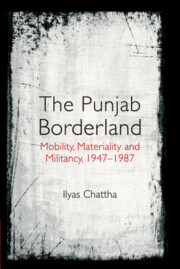Book contents
- Frontmatter
- Dedication
- Contents
- List of Figures
- List of Tables
- Preface and Acknowledgements
- Note on Transliteration
- List of Abbreviations
- Introduction
- 1 Making of the Border
- 2 Cross-Border Flows
- 3 Illicit Cities: Contraband Trade between Lahore and Amritsar
- 4 Illicit Global Gold Trade and Wagah–Attari Crossing
- 5 The Making of Contraband Culture: People and Poetics
- 6 The Regulation of Cross-Border Flows and State Patronage
- 7 Guns, Drugs and the End of the ‘Good Old Days’
- Conclusion: Between Open and Closed Borders
- Glossary
- Appendix
- Bibliography
- Index
6 - The Regulation of Cross-Border Flows and State Patronage
Published online by Cambridge University Press: 30 November 2021
- Frontmatter
- Dedication
- Contents
- List of Figures
- List of Tables
- Preface and Acknowledgements
- Note on Transliteration
- List of Abbreviations
- Introduction
- 1 Making of the Border
- 2 Cross-Border Flows
- 3 Illicit Cities: Contraband Trade between Lahore and Amritsar
- 4 Illicit Global Gold Trade and Wagah–Attari Crossing
- 5 The Making of Contraband Culture: People and Poetics
- 6 The Regulation of Cross-Border Flows and State Patronage
- 7 Guns, Drugs and the End of the ‘Good Old Days’
- Conclusion: Between Open and Closed Borders
- Glossary
- Appendix
- Bibliography
- Index
Summary
India and Pakistan tried to deal with the potential threats of smuggling through the physical presence of forces at the border and to erect a body of legislation to stop illegal traffic. This chapter details the triumphs and frustrations of the law enforcement's attempts to regulate contraband along the borderlands, on high seas, in the air and in parliament. It explains to what extent smuggling was to be controlled through the long length of the border. What nodes of control and mechanisms of surveillance were employed to establish territorial legitimacy and economic sovereignty? What was the best mechanism for keeping the borderland societies under control? Were lessons that were learned at one border applied at the other? An examination of the state response to the threat of unregulated mobilities in the early years of independence not only provides an understanding of the ‘everyday state’ working at the new international border but also sheds light on the evolution of the formation of a modern system of border schemes, their implementation and challenges to them by mundane transgressions of the borderlanders.
The chapter reveals that while policing, legislation and technologies of enforcement continued to be changed and upgraded over the years, India and Pakistan largely failed to stem the rising tide of smuggling. In that sense, it clarifies both the mechanics and the failures of state-making at another level. The chapter also shows how border institutions involved local people directly in anti-smuggling measures through the informal intelligence-gathering system. Finally, the chapter shows how anti-smuggling efforts significantly increased during Ayub Khan's military rule in Pakistan. These drives were intended as a fix for the problem of price increases and to combat hoarding. While they formed part of the initial attempt to restore some semblance of law and order after months of crime, this chapter reveals how these regulation initiatives were subsequently deployed as weaponry against rival politicians. At the very same time, this study exposes how paradoxically Pakistan's ‘gold king’ smugglers immensely depended on a wide range of institutional resources and state patronage.
The state had a significant role to play in the smuggling operations at the Punjab border. There is a great deal of literature that looks at transnational illegal economics at border areas as places where the state fails to rule efficiently.
- Type
- Chapter
- Information
- The Punjab BorderlandMobility, Materiality and Militancy, 1947–1987, pp. 202 - 234Publisher: Cambridge University PressPrint publication year: 2022



